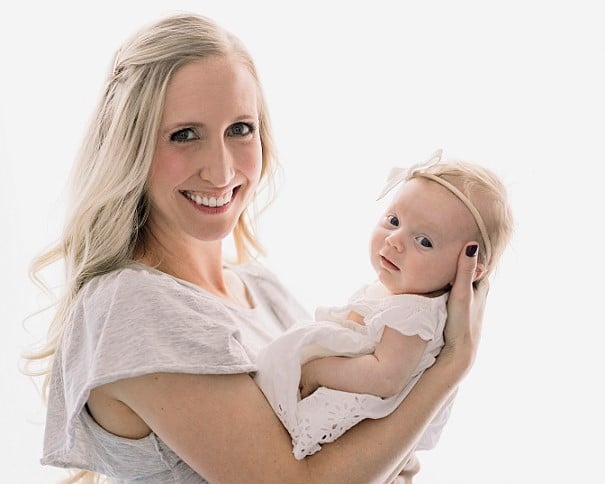Starting to help your baby learn to sleep better can start as a newborn. And while it may not look like “sleep training” this optimization will be helpful for babies in the 1-6 week old phase!
How to Optimize Newborn Sleep During the First 6 Weeks
When my youngest, London, was born, I created a series of blog posts about newborn sleep that walked through my experience with having her home the first 5-6 weeks.
As a sleep training consultant, I have helped so many mamas and babies get the sleep that they need, but every newborn is different! I had a lot of ups and downs with London.
You can help your newborn sleep from birth on Day 1
Now, I have decided to clean up my previous posts and make them into one good blog post. I want to help other mamas with newborns who won’t sleep. So, here’s my comprehensive blog post on what newborn sleep training can look like from the beginning and how moms can help newborns sleep well from day one.
I want mamas out there to get a realistic look into how to establish healthy sleep patterns for newborn babies. Furthermore, I want to help mamas figure out how to deal with the millions of wrenches our babies throw into the mix.
Week 1: Bringing Baby Home
First step in establishing good sleep for your newborn: If you haven’t already, download my FREE newborn sleep guide. It’ll give you a good rundown that you can print and keep with you!
When it comes to establishing healthy sleep patterns for a newborn, we have to prioritize. My two main priorities right out of the gate with London were orienting day/night and getting full feedings.
Orienting Day/Night for Newborn Sleep Training
Firstly, we DO NOT want wakeful periods at night. Especially, when trying to maximize newborn sleep.

It’s hard enough that we have to get up so often to feed them. When it takes an hour or two for them to fall back to sleep it’s extra painful. Orienting day/night is going to be challenging.
I made the mistake with my first baby of wanting too much awake time during the day (so she’d sleep at night, right?). Well, I was inadvertently making her overtired! With London, I had trouble finding the right balance of day time wakefulness. You don’t want to make your baby overtired but you still want to get them to get nice and sleepy after being awake.
It’s hard to wake a sleeping baby and figure out what her natural routine is before you start intervening. But you want to start making the awake times during the day a little longer and trying to get baby to have nice, full feedings before bedtime. This will help them sleep through the night longer for that first stretch of sleep.
London had about 30-60 minutes of wakeful/stirring time before she fell back to sleep. This was probably due to gas, since newborns aren’t used to gas or tummy troubles.
A Typical First Week at Home With Baby:
- Wake up around 8:30am
- Nap on and off inconsistently throughout the day
- 9/9:30pm last feeding and then bed
- 1:00am wake up to eat
- 4:30am wake up to eat
Planning Ahead for Week 2 With Baby at Home:
- Focus on getting good awake time after each feeding during the day.
- Keep things bright and noisy during daytime naps.
- Keep finding the balance of getting enough wakeful time during the day without making her over-tired.
Newborns sleep 16-20 hours a day so to keep trying to figure out how much awake time baby needs for optimal sleep.
As a general rule, newborns shouldn’t have wakeful stretches longer than 1 or 2 hours.
Try to get a full feeding every time.
This is hard because the pressure they feel to sleep is STRONG.
It feels nearly impossible to keep them awake to continue eating, but we want them to nurse for as long as possible to promote milk production. Plus, it will help them get longer stretches of sleep.
In my experience, it takes 20+ minutes per side for a good, full feeding. This differs for each person.
Other Priorities for Week 1:

Focus on getting to know your baby.
Play detective. Figure out what her little nuances are and tune in (as much as possible) to what different things mean. But try not to let the second-guessing go overboard and stress you out.
Take care of yourself. Let others take care of you too!
It’s all too easy to neglect yourself when you have a baby. You have all this adrenaline from having a new baby and you don’t feel as exhausted as you really are. Here are a few concrete suggestions to boost your self-care:
- Visitors: you might feel guilty letting them do things for you that you can do yourself…it’s worth letting them do these things!
- Sit down, snuggle your baby and let people wait on you.
- Say yes to offers for meals from friends.
- Don’t feel like you have to entertain your guests.
- Take naps if you can.
- Cry if you need to.
- Take medication if it helps.
Postpartum Depression
I’ve heard way too many moms tell me they think they had postpartum depression but didn’t realize it until after the fact. Scary thoughts are normal. You do not have to feel shame about them. When they intrude and inhibit your life, take the time to talk with a professional who specializes in postpartum anxiety and depression.
Pay attention to yourself and your emotions. You matter, momma.
Medication is so helpful and it doesn’t mean you’re broken. Do what you need to feel happy and feel like yourself. Self-care is NOT selfish.
Week 2: Baby’s Sleep Can Improve
Bedtime and Swaddle
We’re still trying to orient day and night and getting a nice routine down. With London, most of the week was pretty consistent with:
- 9/9:30 bedtime
- Wake up at 12:30/1
- Another wake-up around 5
- Prepare for the day around 8:30.
She squirmed a lot at night and dropped her paci, and again that could be from gas.

Swaddling is so important for newborns. It helps with relaxing baby and imitates her environment while she was in the womb.
Here’s my swaddle tutorial blog to get that swaddle nice and tight!
Newborn Sleep Training and the Reflux Battle
If your baby is being fussy and you’ve tried the swaddle, swinging, and other soothing practices, the culprit may be gas. Check out my gas and reflux guide for newborns!
A few signs that indicate a baby could be experiencing reflux are:
- Baby is uncomfortable on their back
- Arching of the back when feeding
- Smell of acrid milk
How to get rid of baby’s reflux and pain
Have them fall asleep, propped on you, on their stomach. Don’t let baby fall asleep on their stomach in the crib, but if they are propped at an angle on you, it helps a lot to get rid of that reflux.
Some basic positioning tips to reduce reflux:
- Knees bent under baby’s body to help push gas out, if that’s the problem.
- Can position with pressure on the top part of her belly, to help get burps out.
- Baby can easily lay her head down and comfortably fall asleep when she’s ready.
- Propped up, which will alleviate discomfort from reflux.
You can’t spoil a newborn, so if baby falls asleep in the swing, that’s OK. You want to make sure baby is getting all the sleep that they need. And, if your baby is having signs of acid reflux, talk to your doctor about your medicine options and how to move forward!
Sleep Training Week 3: Scheduling Sleep
For London, this is when we got her on Zantac and it made the world of difference! Read more about how to spot reflux.
Establish a (Flexible) Schedule With Your Newborn
At this point, orienting baby to day and night should be getting better and better. Schedules should keep getting more predictable. If your baby is still going through tummy troubles or reflux, this might set things back a little. Just give it time, try different medications and see what’s working better with your baby.
Baby should also have more alert time after those feedings. Again, getting those nice, full feedings before bedtime will help baby sleep for longer.

A Sample 3-Hour Schedule for Baby: Week 3
- Wake up
- Eat for about 45 minutes
- Poop, burp, spit, fart
- Awake and alert for about 45 minutes
- Sleeps for 1 ½ hours
- Repeat
Baby Bottles and Preparing for Pumps
If you haven’t introduced a bottle yet, do so this week. Even if you are planning to be a stay-at-home mom, it’s so worth it to get them used to a bottle as soon as possible.
There will be times that you’ll need to leave your baby for a doctor’s appointment, date night or a solo grocery trip and it will be a giant relief if you know they’ll take a bottle in your absence.
How to Start Introducing a Bottle to Baby
Give your baby an ounce or two of expressed breast milk once or twice a week, and they’ll be golden.
If you’re not planning to pump a ton, I am totally in love with this manual breast pump.
It feels so natural and I love how quick it is. In less than 30 seconds you can be set up and pumping.
For those mamas that pump a lot, this is my favorite double-electric breast pump. I’ve tried several, and the spectra is amazing. And this hands-free pumping bra is an absolute must.
Sleep Training Week 4: Rhythm and Routine

Sleep Patterns for Your Infant
At this point, things should be getting into a rhythm! London’s routine was this same(ish) pattern pretty regularly around this time:
- Every 2 ½ to 3 hours between feedings
- Nights are consistently longer than daytime stretches
- We hold steady at 5 hour stretches at night (but every few days she’ll surprise me with a longer one)
Sleep at night should also be getting progressively longer and longer. Nighttime and daytime feedings should also be getting pretty solid as well.
Around 4 weeks old, a lot of mamas start to feel like they’re finding a groove. If you’re not in a groove yet, don’t fret. You’ll get there.
If you’re still feeling super duper overwhelmed there’s nothing to be ashamed of. Motherhood is hard and hormones are a rollercoaster.
Lots of moms also start to get impatient that their postpartum body isn’t bouncing back as quickly as they’d like.
DON’T Diet, Momma. You Need Nutrients.
Your baby needs all those nutrients. Eat cleaner if you want to, sure, but don’t restrict your caloric intake.
You will be eating way more than you did when you were pregnant—you’re still nourishing a full human entirely from your body, and now she’s not on the inside anymore squishing your stomach capacity.
Be patient with yourself.
It took 9 months to make a baby and may take just as long to “bounce back” to your new normal.
Feeling Frustrated With a Fussy Newborn
You may find yourself with a discontented newborn. There are several reasons for this:
- Reflux
- Gas
- Milk intolerances
- Over-tiredness
- Over-stimulation
Your baby is probably more alert than she was a few weeks ago. This may mean that she needs more help going to sleep.
Remember: you can’t spoil a newborn so go ahead and rock her to sleep, use the swing, snuggle her, wear her in a backpack or wrap, etc.

And, don’t forget to swaddle that baby nice and tight! See my swaddle tutorial for in-depth instructions.
Lots of parents think their babies don’t like to be swaddled, but my experience shows that most often the swaddle is just too loose.
Our aim right now is to do whatever we can to make our babies as happy as possible. We’ll work on fostering good habits and self-soothing later.
Right now, the most important thing is that your baby is eating good meals and getting good sleep.
Preventing over-tiredness now sets the stage for smooth sleep training in a few months.
Remember: tiny babies don’t like to be awake for more than an hour or so at a time.
Sleep Training Week 5: Fighting the Six-Week Sleep Regression
Week 5 is where we saw London take a big step backward in her sleep at night. During week 4, we were getting 7.5-hour stretches of sleep. At the end of this week, we slept 2-4 hours at a time at night.
Sometimes, for no good reason, things fall apart. It’s hard not to lose hope when you have 2 or 3 bad nights, but this is just a temporary phase.
6-Week Sleep Regression & Training
A 6-week sleep regression is VERY common. My guess is that we hit it a week early. Two major things happened this week that were worth noting.
1) Incomplete feedings
Eating can become a battle. You might start to think that your baby is just eating faster that’s why they start fussing after 5-10 minutes. Try to keep feedings at 20 minutes and make sure you look for signs of reflux or gas.
2) Over-stimulation
At around 6 weeks, it’s common for babies to be more awake and alert and have a tougher time drifting into sleep with less effort. As a result, it’s REALLY easy to over-stimulate them.
Don’t panic that your baby is bored or feels neglected for not being able to see everything that is going on. It sounds silly as I write it, but as parents, we’re ALWAYS projecting our own thoughts and feelings onto our kids.
It’s important to pick up on their newborn sleep cues during this time because they’ll try and push through them when something exciting is going on.
Remember, you can’t spoil a baby.
I needed to use sleeping aids like pacifiers, swings and rocking her to sleep WAY more during week 5.
But remember, babies can’t self-soothe yet, and she won’t get into bad habits this early in life.
Objective #1 for good sleep throughout LIFE is preventing over-tiredness. So, do what you have to do to keep that baby calm and getting all the sleep she needs.
Have you heard of Dr. Harvey Karp’s 5 S’s for soothing a fussy baby? You’ll need all the tricks you can find to soothe madame fussy-pants when you hit this week too.
Get More Help With Newborn Sleep
Do you feel better about sleep already? There is hope, momma. I sure packed a lot of information on this blog! There is so much more to learn about sleep training an infant, sleep regression, correcting sleep issues with a toddler and even improving adult sleep or chronic insomnia!
If you still have questions or want a more tailored sleep training guide, I have a sleep training book you can find on my education and sleep products page or you can purchase a sleep training consultation by yours truly, The Peaceful Sleeper!
xoxo,
Chrissy



0 Comments